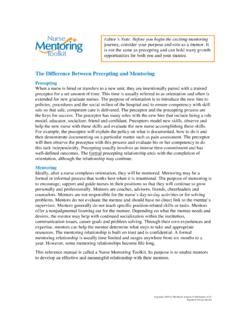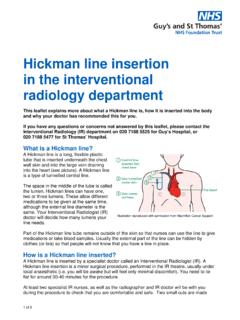Transcription of How Am I Doing? Evaluation and Feedback
1 Copyright 2009 by The Health Alliance of MidAmerica LLC Reprinted with permission How Am I doing ? Evaluation and Feedback Objectives Describe the four steps in the Evaluation process Demonstrate how to provide effective and constructive Feedback Examine samples of Evaluation tools Copyright 2009 by The Health Alliance of MidAmerica LLC 1 Reprinted with permission Evaluation and Feedback Reflecting It has been years since my first precepting experience. That new employee I precepted back then occasionally functions as charge nurse on our unit.
2 A few weeks ago, she helped me with a critically ill patient of mine. That is the beauty of precepting. What you give, you get back, whether it is directly through working with a new co-worker or indirectly by helping a new nurse enter the profession with confidence. Precepting is the wheel that makes nursing turn and continue on down the road. (Lisa R. Davila, RN) Evaluation How do I evaluate? What do I evaluate? What do I document? Evaluation tools Why do I evaluate?
3 Evaluate Competence Use the Critical Thinking Indicators Evaluating Knowledge and Critical Thinking Ask questions/give scenarios Why do you think the physician ordered that? What do you think is going on with the patient? What lab values/test would you want to look at/have ordered? Copyright 2009 by The Health Alliance of MidAmerica LLC 2 Reprinted with permission Questions to Evaluate Knowledge and Critical Thinking Skills You may expect your preceptees to be able to answer the following questions. Use your own judgment to determine which questions to ask based on the knowledge you have of your preceptee.
4 Some questions are appropriate for new graduates, and some are appropriate for experienced nurses. When Administering Medications: What is the medication needed? Side effects? How will it affect THIS patient? Are there labs or vital signs you want to check before/after you give the med? If IV med, have you given an IV med before? What is the technique for giving IV meds? What is the recommended rate of administration? What might happen if you give it too fast or slow? Have preceptees write out drug calculations when necessary.
5 Consider asking these or similar questions during the preceptee s time with you. Let them impress you! What do you know about this patient physiologically that explains this behavior and drives your interventions? What can you do that will help this patient get through this situation? How can you help as a patient advocate? What s the next step in getting the patient home? What changes would you make to solve .. ? What would happen if .. ? Can you predict the outcome if .. ? What might you anticipate as a complication of this procedure?
6 Can you propose an alternative plan/treatment/med/method .. ? Would it be better if .. ? How could you determine .. ? How would you prioritize .. ? Based on what you know, how would you explain .. ? What data did you use to make the conclusion .. ? How would you compare this patient s situation with a previous patient or the textbook picture? Copyright 2009 by The Health Alliance of MidAmerica LLC 3 Reprinted with permission Explain why. How do you know that? What are other possible reasons for .. ? What would you do if.
7 ? What would you do if your patient s blood sugar was 50? Why would you hold the insulin? What is the physiology behind this decision? We make decisions based on assumptions. Are our assumptions correct? On what data are you basing this assumption? What assessment techniques were used to make this assumption? My patient has had a urine output of 200 mLs during the past 12 hours. What conditions, disease states or medications could be causing this symptom? What assessments would you complete on this patient? What are other possibilities or alternatives?
8 How might the patient view this situation? What are other ways of approaching this situation? If this occurs, what would you expect to happen next? Why? What would be the effect of your intervention for this patient? Your patient is SOA (short of air). What further assessment and interventions should take place? Copyright 2009 by The Health Alliance of MidAmerica LLC 4 Reprinted with permission Evaluating Attitude Observe Listen to your preceptee to your co-workers Recognize contribution to team examples of accountability examples of lack of accountability Evaluating Skills Observe identify patterns Compare performance policy/procedure standards of care Evaluation Process (Alspach, 2000) Measurement What are you measuring?
9 Comparison compare performance to a standard Appraisal objective assessment of performance Decision Where do we go from here? Proactive Evaluation Ongoing Open two-way conversation Continuous Feedback is key! Evaluation Tools Hospitalwide Unit-specific Copyright 2009 by The Health Alliance of MidAmerica LLC 5 Reprinted with permission Date: _____ Name of Orientee _____ Preceptor _____ Unit_____ Clinical Knowledge and Performance Score 1 6 1 = Requires monitoring, unable to safely function alone 4 = Requires minimal assistance 2 = Requires complete assistance 5 = No assistance required but still dependent on preceptor 3 = Requires monitoring of activities & some assistance 6 = Works independently Any score below a 4 requires documentation (may use the back of the form).
10 Complete weekly and return to educator or manager 1 2 3 4 5 6 Comments COMMUNICATION Communicates in a clear and timely manner Remains approachable Welcomes and accepts constructive criticism Communicates effectively with pt and family Communicates with members of multidisciplinary team CRITICAL THINKING SKILLS Critically reviews pts. condition and identify needs Implements the plan of care Demonstrates ability to make appropriate changes in plan of care Anticipates needs and follows up with to ensure needs met Demonstrates ability to respond to emergency situation Solves problems as they occur Seeks appropriate resources DELEGATION/LEADERSHIP Identifies appropriate task for delegation Delegates tasks appropriately and supervises care Makes expectations clear Provides appropriate support



